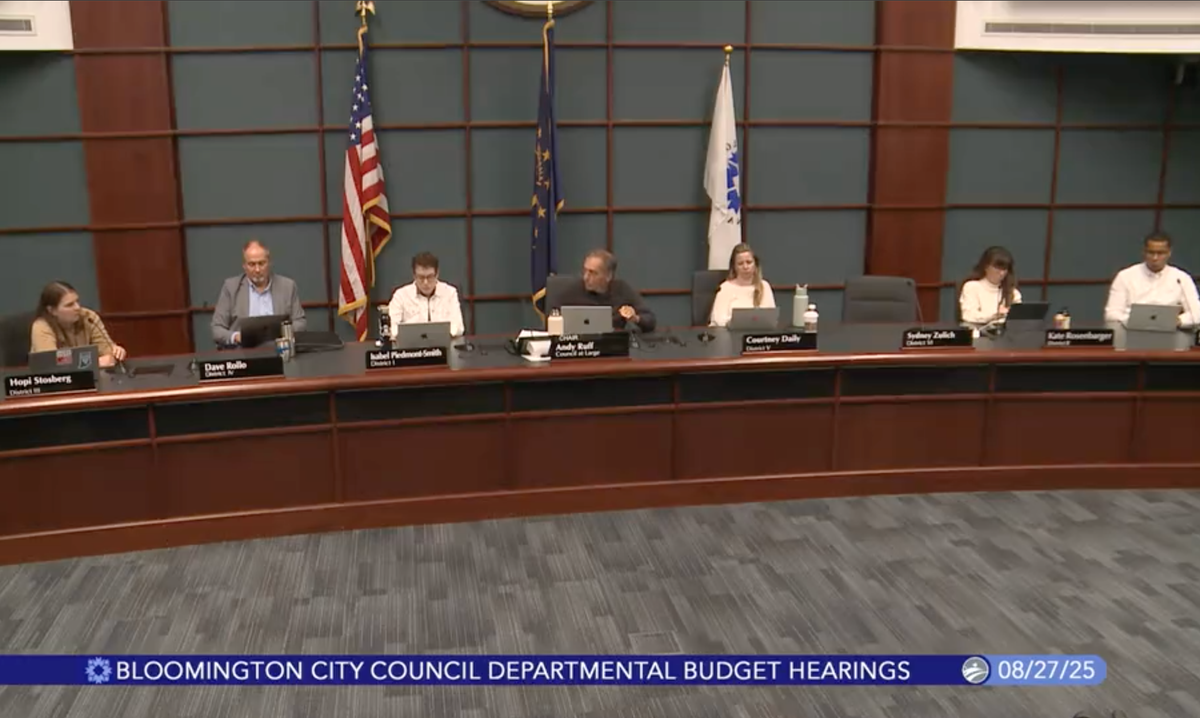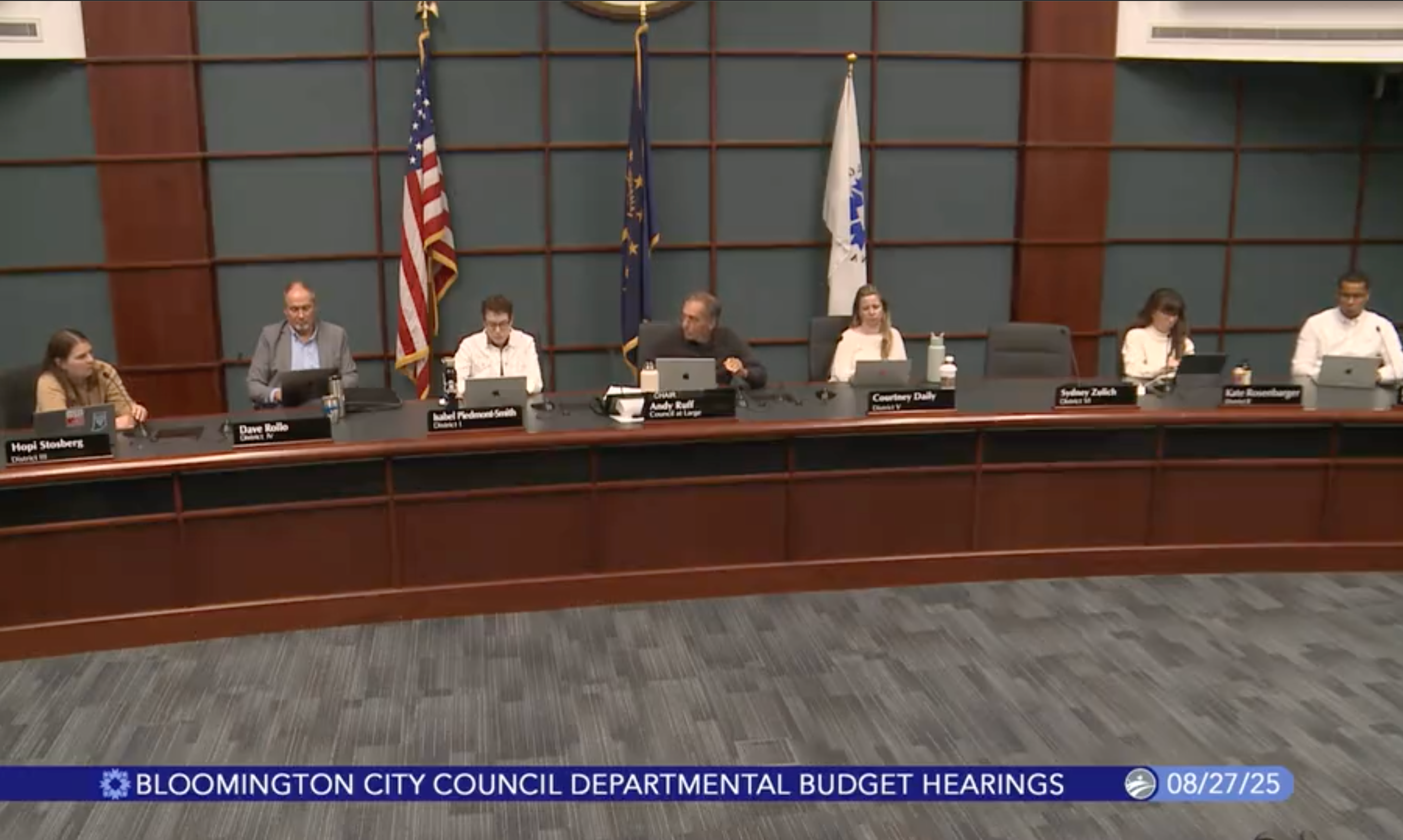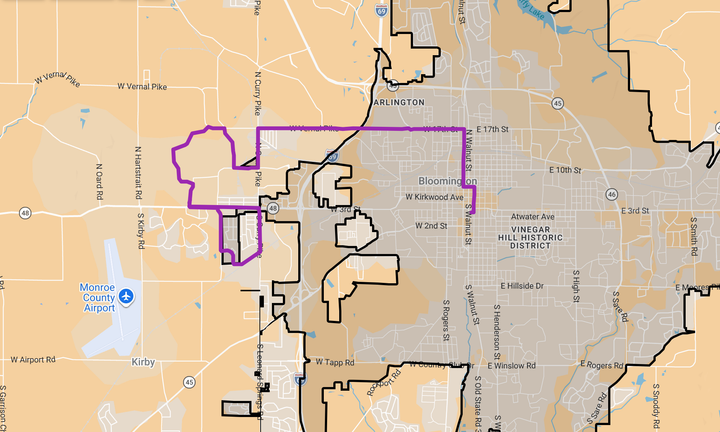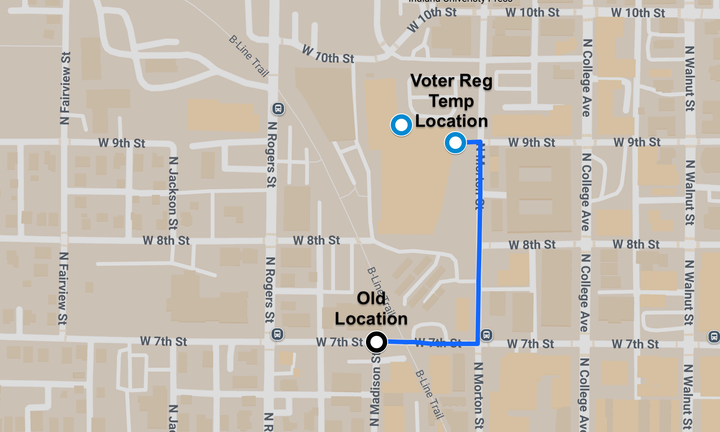2026 Budget notebook: Bloomington council, mayor likely to boost staff COLA from 2% to 2.7%
On Wednesday, Bloomington councilmembers appeared to reach a consensus that the proposed cost-of-living adjustment (COLA) for city employees that is baked into Bloomington mayor Kerry Thomson’s proposed 2026 budget should be increased from 2% to 2.7%.


On Wednesday, Bloomington councilmembers appeared to reach a consensus that the proposed cost-of-living adjustment (COLA) for city employees that is baked into Bloomington mayor Kerry Thomson’s proposed 2026 budget should be increased from 2% to 2.7%. That’s a percentage that would come closer to inflation as measured by the CPI (consumer price index).
City councilmembers were wrapping up four departmental budget hearings that were spread over two weeks, starting on Monday, Aug. 18. Their county councilor counterparts in Monroe County’s government won’t conclude their budget hearings until the second week of September.
The county council is assuming a 3% COLA for county workers.
Council president Hopi Stosberg opened the discussion saying that some members of the city council’s fiscal committee were interested in pushing the COLA increase to 2.7%.
Councilmember Isabel Piedmont-Smith was among those advocating for the higher adjustment. “I am in favor of increasing it to 2.7%,” she said. Alluding to the six new positions called for in the 2026 budget Piedmont-Smith said, “We’re adding staff before we’re doing right by the staff we already have. I think that’s a bad practice,” Piedmont-Smith said.
Pidemont-Smith suggested that some of the funding could come from the legal department’s budget, pointing to the “special legal services” expenses, which are budgeted at $917,800 for 2026, which is the same as for 2025, but more than twice the figure budgeted for 2024, which was $384,500. The actual amount spent in 2024 was $346,542.
So far this year $223,767 has been spent in the “special legal services” category according to the numbers in the city’s online financial system.)
Councilmember Dave Rollo echoed support for increasing the COLA stating that the administration’s effort to give significant pay increases with a new salary grading system had been required because previously compensation had not kept pace with inflation. When compensation does not keep pace with inflation, “that’s bad for morale, it’s bad for hiring,” Rollo said. He added, “I think that we ought to keep pace, if at all possible—that should be a priority.”
Councilmember Andy Ruff added, “I agree we should... support the idea of raising the COLA to the cost of living—if not, it’s really effectively a pay cut, and I think that has an effect on morale.”
Other councilmembers, including Courtney Daily and Isak Asare, also voiced support for the increase, while emphasizing the need for fiscal discipline. “We need to incorporate the cost of living adjustments as well,” said Daily. “We are facing some really, really tough financial choices, and I think we need to be super strict with our budget.”
Councilmember Kate Rosenbarger was matter-of-fact in response to the question of whether councilmembers supported a 2.7% COLA “Yes, I support that, thanks.”
Unlike their county council counterparts, who decide the county government’s budget, the city council can’t on its own increase the city budget. The increase has to be put forward by the administration.
But on Wednesday, the administration signaled a willingness to accommodate the higher COLA. Deputy mayor Gretchen Knapp told the council that she and city controller Jessica McClellan had already talked about the COLA. McClellan thinks it’s possible to accommodate a 2.7% increase, Knapp said. But Knapp also described the administration as “nervous” about the idea. She said funding the additional 0.7 points of the increase would require just under half a million dollars.
McClellan herself weighed in to explain the complexities of paying for the increase across various city funds. “We do have some cushion in the general fund to absorb a 2.7% COLA, but other funds are a little more difficult.”
The balance left in the general fund at the end of 2024 for the city Bloomington was $55.3 million. That stacks up against $57.7 million in expenditures over the course of 2024.
Examples of funds where increasing compensation paid out of them could prove more challenging include the parking facilities fund and the MVH (motor vehicle highway) fund, McClellan said.
There are some options for paying higher compensation out of funds other than the general fund, McClellan said, like just letting the general fund provide support in the short term, or trying to find more cuts in those funds. As an example of the type of cut, McClellan gave overtime expenses. McClellan said, “I’m going to work really hard with the administration, with the other departments, to try to find a way to work that 2.7% into all the funds that we have.”
The COLA that was the object of the council’s deliberations affects non-police and non-fire and non-AFSCME positions. AFSCME (American Federation of State, County and Municipal Employee) workers in Bloomington city government are currently in contract negotiations for an increase in 2026. Police officers and firefighters will receive a 3% increase in 2026 under the terms of their collective bargaining agreements reached last year.
The council is looking ahead to a presentation of a final budget, with possible revisions before then by the Thomson administration, on Sept. 24, with a vote on final adoption set for Oct. 8.




Comments ()